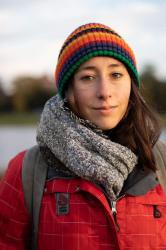The Skjaldborg festival has nurtured Iceland’s documentary scene since its inception in 2007. Like most other aspects of society, it wasn’t exempt from COVID’s unrelenting grasp.
As the saying goes: “You never know what you’ve got till it’s gone.’’ Something tells us that’s not something Kristín Andrea Þórðardóttir and Sigríður Regína Sigurþórsdóttir, key players in the Skjaldborg team, needed to be reminded about. In their own words: “Skjaldborg celebrates stories and people. It’s not the same without allowing people to connect, converse and reflect on the stories.”
The duo’s passion for documentary filmmaking is infectious—so much so that it made us want to get into filmmaking, or at the very least, go to the festival! Any chance anyone could drop us off in Patreksfjörður this weekend?
Setting itself apart
Asked what keywords they would use to describe Skjaldborg, Kristín and Sigríður share a ponderous look and say: “It’s so difficult to choose!”
So we redirect: what makes Skjaldborg special? “It’s Icelandic!” Kristín exclaims without hesitation. “And it’s the only one of its kind. We want to give a platform to Icelandic filmmakers. If we were to become an international film festival, it would be a completely different concept. It would need to run for at least 10 days. This is a concentrated documentary film festival, celebrating Icelandic films, while also bringing in inspiration from foreign guests of honour.”
This year’s guest is an especially exciting one: award winning documentary filmmaker Magnus Gertten. He’ll be showing two films, ‘Nelly and Nadine’, which received a Teddy Award earlier this year, and ‘Every face has a name’, which documents the journey to finding the 2000 concentration camp survivors who arrived in Malmö in 1945. Magnus creates a space for their voices to be heard.
Iceland’s Far West
Location also plays an important role in setting the festival apart. Patreksfjörður, an old fishing village with a tight-knit community, represents all that is quintessentially Icelandic.
“If it was in Reykjavík people attending the festival wouldn’t be as close together from morning to evening,” Kristin says. Patreksfjörður allows for people who share a love for documentary filmmaking to have more opportunities to meet and be together. She adds: “That is key to documentaries. Their dissemination, and the conversations they spark.”
Kristín likens the festival to “an extended family, a reunion”. However, she reassures us that it’s not closed off to newcomers.
“Even if people just watch one screening, or go to one event, or get introduced to filmmaking, then it will have been worth it,” Sigriður agrees. This is why they have made sure that all the screenings and events which take place in the cinema are free. The only ticketed item is their wristband pass, which mainly covers extra activities and food. Inclusivity is crucial for Kristín and Sigriður.
Treasures of the everyday
Most years, the festival’s theme reveals itself organically, influenced by the submissions, which are chosen by a separate committee. This year’s focus is intentionally the past—a celebration of history, prompted by a collaboration with The National Film Archives of Iceland. Sigriður explains that Iceland is unique in the preservation of film records—the cold weather provides better storage conditions. In fact, they have managed to scan footage from between 1930-1970 into 4K and have made it accessible to the public.
The Home Movie Collective is a new initiative made in an effort to involve the local community in collecting, and preserving old tapes. Archivists will be restoring and curating the collected film on June 1st and 2nd, and screening it on the 4th. Sigriður lights up as she thinks about all the great footage they might find and says: “Home movies are special because they record cultural heritage as seen by the people who lived through it, it’s not shaped by historians.”

Support for budding filmmakers
Skjaldborg is always looking to support new talent, which is why they showcase works in progress. Filmmakers get to present their trailer and receive feedback from the audience. Their finished projects often go on to participate in festivals, and people who previewed the trailer get to see its full evolution. The winners of the festival also receive vouchers for free post-production work from Trickshot and to use equipment from Kukl for their next project.
As our time comes to an end, Kristín and Sigriður both remember that first, unanswered question about keywords. “ I think we got them now,” Kristín says. ”Inspiration, traditions, storytelling.’’
To top those off, we’ll add that Skjaldborg also features amazing food, parties, a parade and a comedy show to cap off a fantastic long weekend.
Skjaldborg will be held from June 3rd through June 6th. More information can be found here.
Buy subscriptions, t-shirts and more from our shop right here!




















